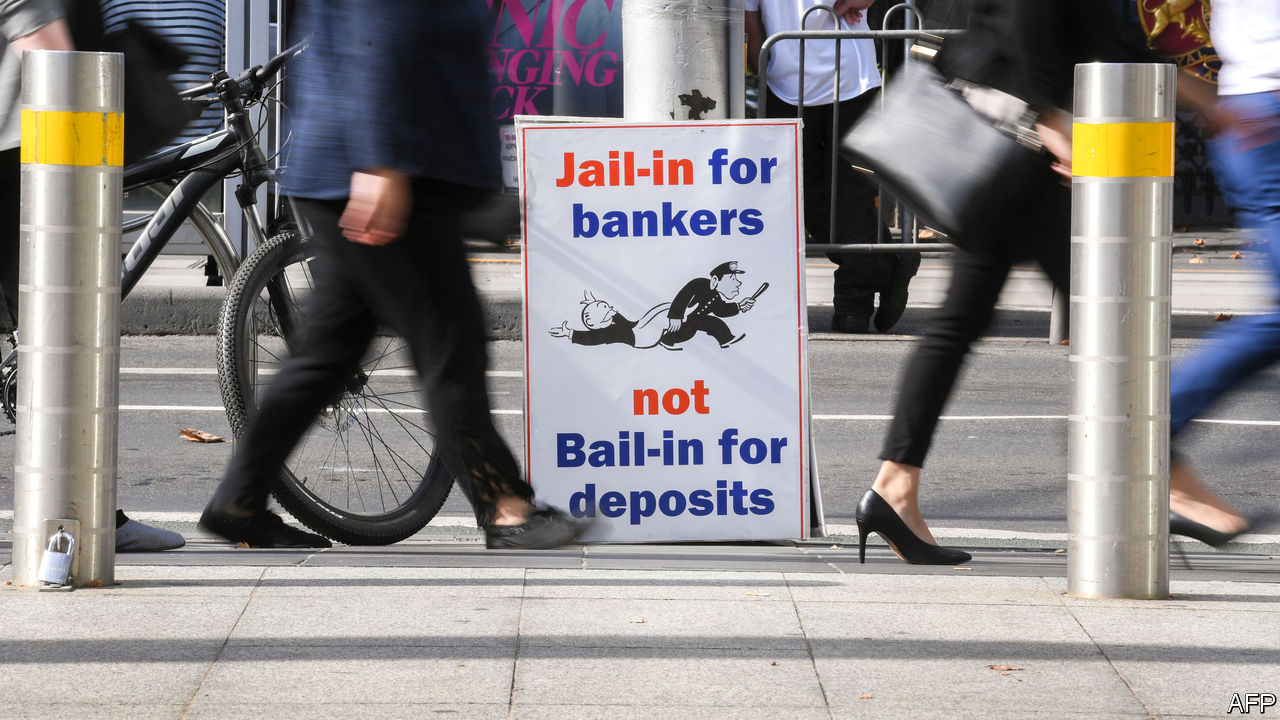Profit and loss
A commission of inquiry reaches a damning verdict on Australia’s Banks
Yet the forced restructuring banks had feared is off the cards

IF A HEALTHY banking system is dull, then Australia’s must be sick to the core. A royal commission with a broad remit to investigate abuses by the country’s financial institutions that opened a year ago has set off fireworks. Hearings revealed that for years banks had hidden fees, swindled money for absent services and docked charges from the dead. Financial advisers earned bonuses for channelling clients’ cash towards underperforming funds. Insurance companies flogged junk schemes to the poor or mentally disabled.
Australia’s four biggest lenders saw their market capitalisation fall by an average of 16.3% while the commission was sitting, knocking A$66bn ($47.1bn) off their combined value. In April the country’s biggest asset manager, AMP, sacked its chief executive and chairman after the inquiry heard that it had not only charged customers for advice that was never provided, but had lied to the regulators about it. More heads may roll now that Kenneth Hayne, the judge who led the inquiry, has handed his final report to the government.
The commissioner has asked regulators to investigate 24 possible breaches of civil or criminal law. The report names institutions rather than individuals, but some people may now come under scrutiny. Mr Hayne expressed particular disgust at those who gouged fees without providing services. Almost A$1bn has already been paid in compensation to their victims.
Offenders may have broken a law against “dishonest conduct in relation to a financial product or financial service”. The report said the Australian Securities and Investments Commission (ASIC), the corporate regulator, should consider the maximum penalties: large fines, or up to ten years in prison for individuals. Thus Australia, a country widely regarded as having had a “good” financial crisis, with a stable, profitable banking system, may become one of the few places where bankers are jailed for institutional wrongdoing.
The report’s 76 recommendations set out to clean up the industry. One is for a new bank-funded compensation scheme for victims of banking misconduct. Some measures target the intermediaries who flog insurance, pensions and mortgages to befuddled Australians. Mr Hayne wants their bonuses slashed, starting with “trailing” commissions paid to mortgage brokers years after they sell a loan. Financial advisers would have to seek customers’ approval when they roll fees forward. It would become illegal to tout pensions or insurance by phone.
These are welcome measures, but many think they do not go far enough. “In the end the banks have got off lightly,” says Michael Rafferty, an economist at RMIT University in Melbourne. The commission exposed the harm to customers caused by conflicts of interest within banks. Yet it stopped short of demanding that they spin off the advisory and wealth-management units implicated in much of the wrongdoing. Three big banks had expected such a ruling and are restructuring along these lines, yet forced separation would be “costly and disruptive”, Mr Hayne concluded.
Nor did he call for stricter checks on affordability before making loans. Lenders have already tightened up here, too, but consumer-protection groups fear they may ease up once the pressure is off. Shares in the four big banks rose by an average of 6.7% the day after the report’s publication on February 4th.
The commission accused industry regulators of being too cosy with the industry. It recommends that they be given more power to punish misdemeanours and curb bonuses, with a new oversight panel set up to ensure they do their job. Yet it is unclear how much authority the panel would have, and the regulators are straitened. “ASIC has been called out for its ineffectiveness since the early 1990s,” complains Allan Fels, a former chairman of the competition commission. “What’s different now?”
Both the coalition government, which looks set for a trouncing in elections in May, and the opposition Labor Party, which is expected to form the next government, have promised to enact all the commission’s recommendations. Little will happen before the vote. But the commission at least gained a hearing from politicians. Banks can count themselves lucky it did not crack down harder.
0 comments:
Publicar un comentario